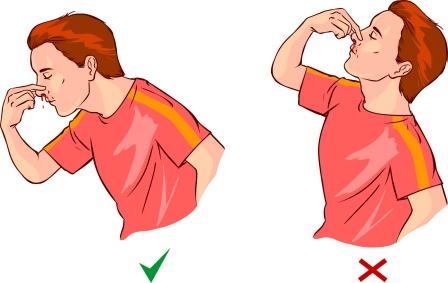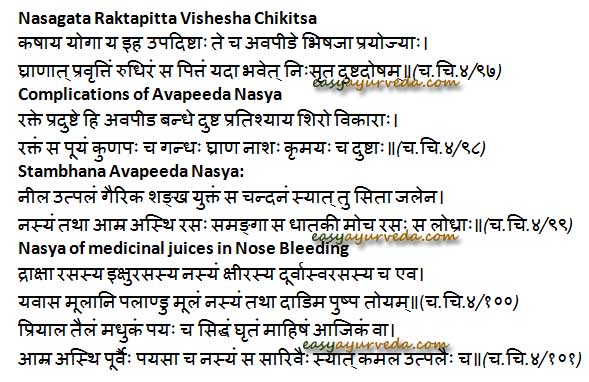Nose Bleed: Ayurvedic Understanding, Treatment
Article by Dr Raghuram Y.S. MD (Ay) & Dr Manasa, B.A.M.S
Nose bleed is explained as Nasagata Raktapitta in Ayurveda. It is a condition in which the blood contaminated by vitiated Rakta and has gone a pathological increase in quantity moves in an upward direction and gets eliminated through nasal passages i.e. nostrils. Nasagata Raktapitta is a type of Urdhwaga Raktapitta (Raktapitta having upward course i.e. vitiated blood traveling in upward direction).
Related reading – Raktapitta: Cluster Of Bleeding Disorders: Meaning, Definition
Table of Contents
Symptoms
Symptoms of Nasagata Raktapitta
The main symptom of Nasagata Raktapitta is bleeding of contaminated blood through the nose. This condition can be compared to epistaxis explained in the modern texts.

Since it is Urdhwaga Raktapitta, the disease will have association of vitiated kapha. It is said to be sadhya or easily curable.
Related reading – Raktapitta Causes, Premonitory Symptoms, Symptoms, Pathogenesis
Treatment
Treatment of Nasagata Raktapitta
Nasagata Raktapitta can be treated following the below mentioned strategies –
Samanya Raktapitta Chikitsa –
Raktapitta should be treated on the lines of general lines of treatment of Raktapitta
Related reading –Treatment Principles Of Raktapitta – Bleeding Disorders
Specific treatment of nasal bleeding –
Just like the general principle of Raktapitta treatment, even in Nasagata Raktapitta the bleeding should not be stopped in initial stages because the bleeding comprises of contaminated blood i.e. blood contaminated by vitiated pitta.
After the elimination of contaminated blood the kwatha or decoctions of Vasa etc which are mentioned in Shamshamani Kriya (formulations to pacify raktapitta) in the general line of treatment of Raktapitta shall be used as avapeedana or nasal drops to prevent the bleeding in Nasagata Raktapitta. Alternatively the juice extracted from individual herbs used in preparation of Kwathas should be used for avapeedana.
Related reading – Ayurvedic Medicines And Herbs Useful In Raktapitta
Complications of Avapeeda Nasya
Complications arising when Avapeeda is administered to stop the bleeding of contaminated blood
When Avapeedana is administered to stop bleeding in Nasagata Raktapitta without allowing the flow of contaminated blood in the initial conditions, the below mentioned complications arise.
- Dushta Pratishyaya – infected nasal discharges
- Shiro Vikaraha – diseases related to head
- Sa Puya Rakta Srava – discharge of blood along with pus from the nose
- Kunapa Gandha Srava – foul smelling discharges (blood) from the nose
- Ghrana Nasha – destruction of sensation to smell
- Dushta Krimi – worms and microorganisms coming out of the nose
Stambhana Avapeeda Nasya
Stambhana Avapeeda Nasya in Nasagata Raktapitta (medicines to stop nasal bleeding)
Neelotpaladi Avapeedana – Neela utpala (flowers of water lily or blue variety of lotus), Gairika (hematite, red ochre), Shankha Bhasma (ash of conch) and Chandana (Sandalwood) should be grinded in Sita jala (sugared water) and squeezed into the nostrils in the form of drops (avapeedana).
Amrasthyadi Avapeedana – Amra Asthi rasa (juice of seed or mango), Samanga (Rubia cordifolia), Dhataki pushpa (flowers of Woodfordia fruticosa), Mocharasa (gum of silk cotton tree) and Lodhra (Symplocos racemosa) should be grinded in Sita jala (sugared water) and squeezed into the nostrils in the form of drops (avapeedana).

Nasya treatment
Nasya or nasal drops in Nose Bleeding (Nasagata Raktapitta)
One or more of the below mentioned juices can be used for checking the bleeding in Nasagata Raktapitta –
- Draksha rasa – juice of raisins
- Ikshu rasa – juice of sugarcane
- Ksheera – milk of cow
- Durva rasa – juice of Cynodon dactylon
- Yavasa mula swarasa – juice of roots of Alhagi camelorum
- Palandu mula rasa – juice of onion
- Dadima pushpa toyam – juice of flowers of pomegranate
- Priyala Taila Nasyam – The oil prepared from Priyala (Bauchanania lanzan) should be processed with cow’s milk and madhuka (licorice). This processed oil should be used for Nasya.
- Maahisha-Aja ghrita nasyam – Nasya should be given with buffalo or goat’s ghee processed with madhuka and cow’s milk.
- Amra Asthi rasa (juice of seed or mango) grinded with cow’s or goat’s milk
- Samanga (Rubia cordifolia) grinded with cow’s or goat’s milk
- Dhataki pushpa (flowers of Woodfordia fruticosa) grinded with cow’s or goat’s milk
- Mocharasa (gum of silk cotton tree) grinded with cow’s or goat’s milk
- Lodhra (Symplocos racemosa) grinded with cow’s or goat’s milk
Just Before Finishing
This article touches upon the Ayurvedic explanation of Nasal Bleeding (Nasagata Raktapitta) and the effective formulations and treatments to combat the same.
Click to Consult Dr Raghuram Y.S. MD (Ayu)







